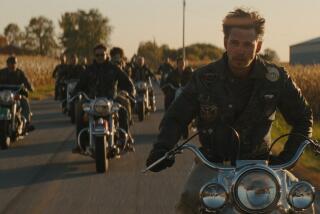TV Reviews : Shepherd Shepherds Riveting ‘Memphis’
- Share via
It’s rare that a television movie reflects a genuine voice--in this case, Southern--and rarer still when a squalid kidnaping caper is magnified by a critical time and place in contemporary history.
“Memphis,” set in the redneck, strife-ridden South of 1957, is a distinctive achievement for Cybill Shepherd, who co-produced, co-stars and wrote the first draft (in a rich adaptation of Southern historian Shelby Foote’s novel, “September, September”).
Subsequently co-written by Susan Rhinehart and Shepherd’s “Last Picture Show” pal Larry McMurtry, shot in Shepherd’s hometown of Memphis and artfully helmed by French-Canadian Yves Simoneau in his American directing debut, this fictional tale of white drifters who abduct a little black boy is riveting from start to finish (it shows three times on the TNT cable channel tonight, at 5, 7 and 9).
The production heralds TNT, after a string of largely ordinary movies, as a creative player and risk-taker and solidifies the image of the adventuresome production company, Propaganda Films (“Wild at Heart,” “Truth or Dare,” “Twin Peaks”).
“Memphis” is compelling for two reasons: for wedding a story of white trash and their mundane crime to a keenly felt background of forced school integration in a rapidly changing South, and for its unusual, deceptively mesmerizing style.
The trio of kidnapers are exceptionally vivid--John Laughlin’s lusting young stud, J.E. Freeman’s older, mysterious accomplice and Shepherd’s ne’er-do-well floozy. They exist in the reckless limbo and dilapidated world of the movie “Bonnie and Clyde,” and it’s a hoot to see Shepherd and Laughlin/Freeman materialize as uncanny playbacks of Faye Dunaway and Warren Beatty.
The drama veers in a surprising direction when Shepherd’s sexually avaricious hanger-on develops a tender and caring affection for the kidnaped boy (Martin Gardner), who, in turn, gradually responds to her like a son in scenes that are never maudlin. Meanwhile, the ransom pickup, shot in Memphis’ old railroad station, hurtles the story to its gripping conclusion.
The director’s pacing has a tremulous Faulknerian resonance and stillness, and the fact that lawmen don’t play any important role is also refreshing. As a bonus, a delightful scene of the kidnapers watching the 1957 Miss America TV show, with Burt Parks and his prim, all-WASP contestants mouthing inanities, hilariously and symbolically underscores the culture.
More to Read
The complete guide to home viewing
Get Screen Gab for everything about the TV shows and streaming movies everyone’s talking about.
You may occasionally receive promotional content from the Los Angeles Times.






